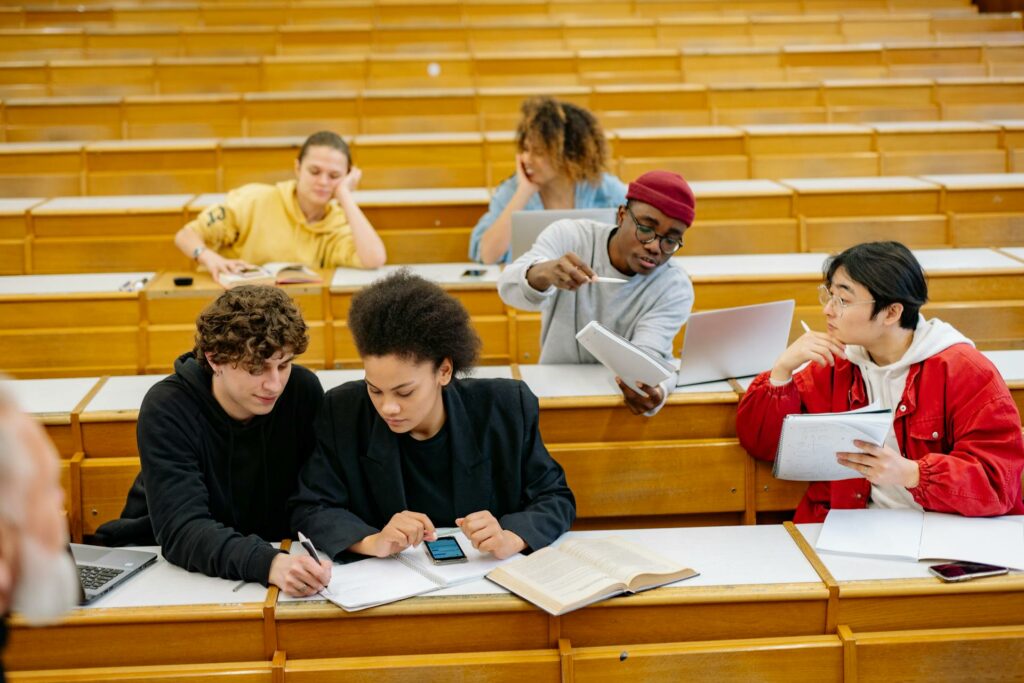Academic Benefits of Collaborative Learning
Enhanced Understanding and Retention
Collaborative learning allows students to engage with the material more deeply. When students explain concepts to each other and discuss ideas, they reinforce their understanding and retention of the subject matter. Teaching peers requires a thorough grasp of the topic, which benefits both the explainer and the listener. Research has shown that students involved in collaborative learning activities tend to retain information better than those who study alone. This process of mutual teaching and learning helps solidify knowledge in a way that individual study often cannot.
Development of Critical Thinking Skills
Working in groups exposes students to diverse perspectives, encouraging them to think critically and consider multiple viewpoints. This process of debate and discussion helps students to develop their analytical skills, as they must evaluate the validity of different arguments and synthesise information from various sources. Collaborative learning fosters a more nuanced and sophisticated approach to problem-solving and decision-making. By interacting with peers who may have different viewpoints and areas of expertise, students learn to navigate complex issues and arrive at well-rounded conclusions.
Improved Academic Performance
Studies have demonstrated that collaborative learning can lead to higher academic achievement. Group work encourages active participation, which helps students to engage more fully with the material. Furthermore, the support and motivation from peers can enhance a student’s confidence and reduce anxiety, leading to better performance on assessments. Collaborative learning also helps to identify and address gaps in knowledge more effectively than solitary study. Students are often more willing to ask questions and express doubts in a small group setting, which can lead to a deeper and more comprehensive understanding of the material.
Social Benefits of Collaborative Learning
Enhanced Communication Skills
Collaborative learning provides ample opportunities for students to practise and refine their communication skills. Working in groups requires clear and effective verbal and non-verbal communication, including active listening, articulating thoughts, and giving and receiving feedback. These skills are essential for success in both academic and professional settings. By engaging in group discussions and projects, students learn how to convey their ideas succinctly and respectfully, negotiate meaning, and build on the contributions of others.
Development of Teamwork Skills
Teamwork is a critical skill in the modern workforce, and collaborative learning helps students develop this ability from an early age. By working together on projects, students learn to collaborate, negotiate, and manage conflicts. They also learn the importance of accountability and reliability, as each member’s contribution affects the group’s overall success. These experiences prepare students for the collaborative nature of most workplaces. They learn to recognise and appreciate the strengths and skills of their peers, which fosters a more inclusive and cooperative working environment.
Building Stronger Relationships
Collaborative learning can help to build stronger relationships among students. Working together towards a common goal fosters a sense of community and belonging. This social support network can be particularly beneficial for students who may feel isolated or struggle with social interactions. Stronger relationships among peers can lead to a more positive school experience and improve overall well-being. When students feel connected and supported by their peers, they are more likely to engage in the learning process and take risks in their academic pursuits.
Personal Development Benefits of Collaborative Learning
Increased Self-Esteem and Confidence
Collaborative learning can boost a student’s self-esteem and confidence. Participating in group activities allows students to showcase their strengths and receive positive reinforcement from their peers. Over time, this can help to build a more positive self-image and increase a student’s confidence in their abilities. The validation and encouragement from peers can be a powerful motivator, helping students to overcome challenges and persist in their efforts.
Enhanced Motivation and Engagement
Learning in a group can be more motivating and engaging than studying alone. The social aspect of collaborative learning makes it more enjoyable and dynamic. Students are more likely to stay engaged and motivated when they feel supported by their peers and are working towards a common goal. This increased motivation can lead to better attendance, higher levels of participation, and ultimately, improved academic outcomes. Collaborative learning activities often involve interactive and hands-on tasks, which can make the learning process more stimulating and enjoyable.
Development of Leadership Skills
Collaborative learning provides opportunities for students to develop and practise leadership skills. Taking on roles such as group leader or project coordinator helps students learn how to guide and inspire others, delegate tasks, and manage group dynamics. These leadership experiences are invaluable and can help to prepare students for future roles in academic, professional, and community settings. Students learn how to manage diverse teams, make strategic decisions, and motivate their peers, which are crucial skills for any leadership role.
Practical Implementation of Collaborative Learning
Creating Effective Groups
To maximise the benefits of collaborative learning, it is important to create effective and balanced groups. Teachers should consider factors such as students’ abilities, learning styles, and personalities when forming groups. Diverse groups can bring a range of perspectives and skills to the table, enhancing the collaborative experience. It is also beneficial to rotate group members regularly to allow students to work with different peers and build a broader range of collaborative skills.
Setting Clear Goals and Expectations
Clear goals and expectations are essential for successful collaborative learning. Teachers should provide students with a clear understanding of the objectives and criteria for success. This helps to ensure that all group members are working towards the same goal and understand their individual roles and responsibilities. Establishing ground rules for group interactions can also help to prevent conflicts and ensure that everyone contributes equitably.
Providing Guidance and Support
Teachers play a crucial role in facilitating collaborative learning. Providing guidance and support throughout the process can help to keep groups on track and address any issues that arise. This might include offering strategies for effective communication, conflict resolution, and time management. Regular check-ins and feedback can also help to ensure that groups are progressing and meeting their objectives. Teachers can act as mediators and coaches, helping students to navigate challenges and optimise their collaborative efforts.
Encouraging Reflection
Encouraging students to reflect on their collaborative experiences can help to consolidate learning and identify areas for improvement. Reflection activities might include group discussions, individual journals, or feedback forms. Reflecting on what worked well and what could be improved helps students develop their collaborative skills and apply these insights to future group work. This process of self-assessment and peer feedback is essential for continuous improvement and personal growth.
Conclusion
Collaborative learning offers a wealth of benefits that extend beyond academic achievement. By engaging in group work, students can enhance their understanding and retention of the material, develop critical thinking and communication skills, and build stronger relationships with their peers. Furthermore, collaborative learning helps to foster important personal development skills such as self-esteem, motivation, and leadership. By implementing collaborative learning strategies effectively, teachers can create a dynamic and supportive learning environment that prepares students for success in school and beyond. The skills and experiences gained through collaborative learning are invaluable, equipping students with the tools they need to thrive in an increasingly interconnected and collaborative world.



